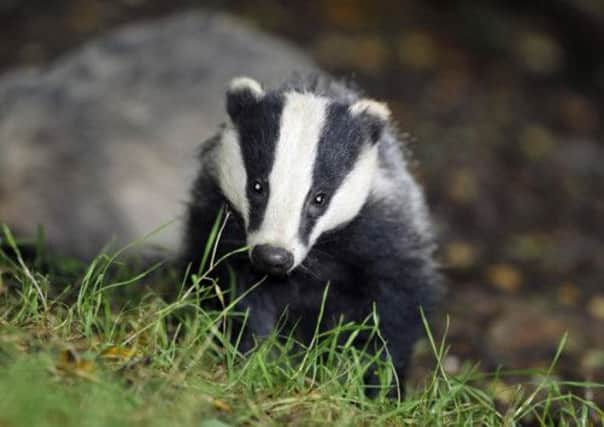Many shades of grey in public’s affection for the badger


IT’s not just in recent years that badgers have had a bad Press.
Back in the 16th-century numerous illustrations depicted the nocturnal creature as a ferocious beast not to be trusted and in 1812 a North Yorkshire schoolmaster recorded that “seven drops of brock blood”, along with the skull fragments of a hanged man and the tongues of adders, were among the ingredients for a brew used in a peculiar religious ceremony.
Advertisement
Hide AdAdvertisement
Hide Ad“We have a long history of ignorance when it comes to badgers,” says Patrick Barkham, whose new book Badgerlands hopes to uncover the truth about the animal which Teddy Roosevelt kept as a White House pet.
“A few hundred years ago, one supposed expert confidently asserted that the the badger’s left legs were longer than its right legs. He said it was so they could run quickly along hillsides, although he never said, as far as I can work out, what happened when they needed to turn around.”
Barkham inherited his own fasination with badgers from his grandma. She grew up in Yorkshire before moving to Cheshire where she not only cared for injured animals, but when baiting was rife, campaigned tirelessly for their protection.
“My grandma looked a little bit like an owl and she was definitely one of those people who preferred animals to humans,” says Barkham. “She was incredibly passionate about the need to protect badgers and she thought that all the talk of the spread of TB was just a farmer’s fantasy.
Advertisement
Hide AdAdvertisement
Hide Ad“I can see why, it was the 1970s and at the time farmers were given a lot of financial incentives to rip up hedgerows and it caused a lot of damage to the landscape. I don’t think her opinion would ever have mellowed, but like most things, the reality is never that simple.”
Writing his new book against the backdrop of the controversial cull which finally began late last month, Barkham wanted to discover whether the average badger had more in common with Kenneth Grahame’s portrayal of the wise old father figure in The Wind in the Willows or Beatrix Potter’s rather less flattering bunny-napper Tommy Brock.
“Ask people to describe a fox and most people will say, ‘cunning’ or ‘wily’. The problem is I don’t think we have ever really decided what we think of the badger. We haven’t made up our minds up whether they are a harmless, snuffling vegetarian or a dangerous spreader of disease.
“Until a few years ago, the closest I’d come to a badger was a fleeting glimpse in a car headlight. Then a friend of mine mentioned that there were some living by a canal in Wolverhampton. When they eventually came out, they looked incredibly exotic and I could really see why our irrational attachment – and it is irrational – exists.
Advertisement
Hide AdAdvertisement
Hide Ad“When all is said and done a badger is a common mammal, it’s not in danger of extinction and it’s no more intelligent than a rat. Most people would have no problem with putting down poison if they were being plagued by rats, but badgers seem to operate by different rules.
“Someone like Brian May, who has become a figurehead for the anti-cull movement, is clearly and genuinely quite tortured by what is happening, but I don’t buy into the argument that says every animal is sacrosanct.”
With the debate marked by claims and counter-claims and expert opinon divided on whether a cull will deliver the desired results, Barkham recently decided to go to one pilot area in west Somerset to see for himself.
“A cull will work, it just depends how brutal we either want or are prepared to be,” he says. “However, out of everything I’ve read and seen surrounding the cull, the one thing that has disturbed me most is the secrecy in which it is being carried out.
Advertisement
Hide AdAdvertisement
Hide Ad“All we wanted to do was see what was going on and perhaps talk to one of the marksmen involved. Eventually we spotted one in a car in front. Our plan was to follow him in the hope that when he stopped we could ask if he would like to be interviewed. Before we had the chance we were stopped by the police who accused us of intimidation.
“I’m not sure quite how they reached that conclusion given me, a fairly wimpy bloke with a torch just wanted to have a chat with a man with a gun. A policy like this has to be transparent because all secrecy does is allow people to misbehave and at the moment there is suspicion in the countryside.”
Badgerlands by Patrick Barkham is out on October 3. He is appearing at Morley Literature Festival on October 13. 0770 985 1445 , www.morleyliteraturefestival.co.uk